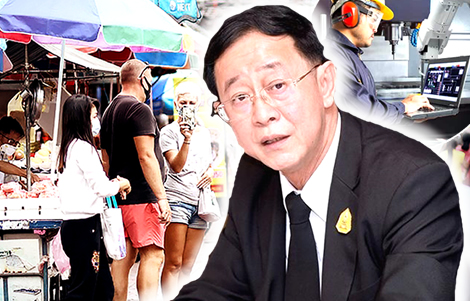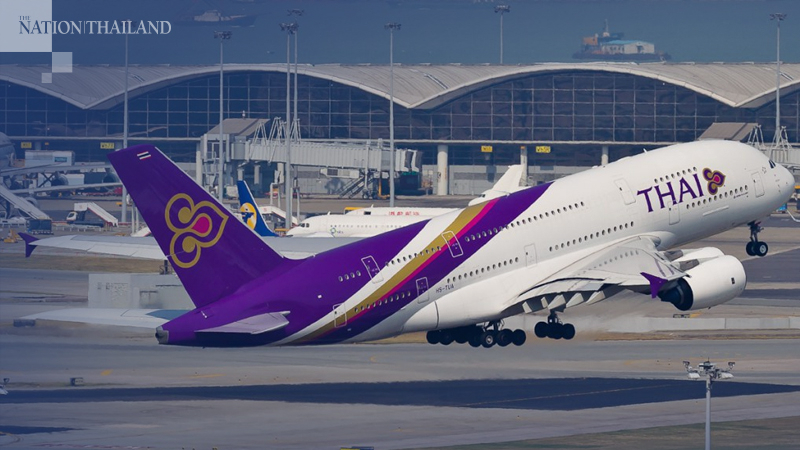New Finance Minister Arkhom Termpittayapaisith appeared, this week, to signal that the government was intent on moving the emphasis of the kingdoms' economy away from the model of past decades, based on exports and tourism, towards the goal of the previous junta government which outlined a plan to create a higher-value economy in S-Curve, industries of the future.
The Thai Finance Minister has suggested that it could take up to four years for Thailand to regain the level of tourism it saw in 2019 and has alluded to a reset. The minister said that the structure of Thailand's economy needs to change to address the current situation. It comes after the Bank of Thailand, at its last Monetary Policy Committee meeting on Wednesday, identified the reopening of the country to foreign tourists as a priority to make sure economic recovery does not stall. It warned of a potential threat to the financial system due to growing levels of household debt and non-performing loans.

Thailand's Finance Minister, the third to hold the position this year, has said that the country's virtually dormant foreign tourism industry will take four years to recover to 2019 levels.
He explained, this week, harkening back to a key policy platform of the junta government from 2014 to 2019, that Thailand must move towards S-Curve industries identified as critical to the Thai government's Thailand 4.0 programme
Please read about Thailand 4.0 here:
Foreigners in Thailand should find out more about Thailand 4.0
Digital assets wizard with an energy and tech vision
Minister Arkhom Termpittayapaisith predicted that the kingdom will see up to 8 million foreign tourists in 2021. Last week, Krungrsi Bank predicted a figure of 4 million visitors when it set a growth forecast of between 2.5% and 3% for the economy next year.
Minister predicts over 4% growth for 2021
The minister is more optimistic and predicted a growth rate of 4% to 4.5% but is cautious about prospects for a full recovery in the tourist sector.
Last week, the Governor of the Tourism Authority indicated that the number of foreign tourists may return to normal by 2022.
The minister has projected 16 million foreign tourists for the year after next, or 2022, which would still be only 40% of the record year, seen last year.
Based on a current arrival level of just over 1,200 tourists a month complying with current, exceedingly demanding entry criteria, it is unlikely that Thailand will achieve anything like normal tourism levels until well into next year and this year's 2020 outcome will record approximately 6.7 million visitors, nearly all who arrived in the first three months.
Four years to regain Thailand's lost momentum in tourism, cut off this year with flight bans
The Finance Minister is predicting that it will be 2023 before anything like normal mass tourism levels will be seen again in Thailand with a projection of 32 million visitors and a further year to attain or surpass the record performance seen in 2019 when 39.8 million visitors flew in. This would be in 2024.
At the end of March this year, Thailand had seen encouraging tourism numbers at the start of the year in what looked like the beginning of another record year for 2020 before the government, first of all, imposed onerous restrictions and then shut the door to all incoming passengers and the country's airspace after an insurrection of travellers returning home who refused to comply with emergency quarantine provisions.
Since then, a small trickle of foreigners has been allowed to enter under rigorous and expensive conditions.
Minister resurrects blueprint of the junta government to transform the structural basis of the economy
The Finance Minister, Mr Arkhom, is a former civil servant who was appointed to his current role on the 1st October. He served nearly four years as Minister of Transport in the junta led government of Prayut Chan ocha from the 19th August 2015 to the 10th July 2019.
In his statement dealing with the economy and the outlook for foreign tourism this week, the minister emphasised that the goal of the current government is to shift Thailand's economy towards new business sectors such as digital technology, robotics and new, green wave ventures.
New tax on online sales activity in 2021
Minister Arkhom also pointed to the introduction of an online tax which is currently making its way through parliament and foresees that this will be implemented sometime in 2021. It will place indirect taxes on the services provided by large technology companies in Thailand at the source.
Concern at the ongoing expansion of the mass tourism sector had been flagged by agencies such as the World Bank, which warned in 2018, of the environmental impact of the rapid rise in visitor numbers entering the country which continued up to the end of 2019.
Tourism industry doubled in value in four hectic years from 2015 to 2019 with 33% more visitors
Thailand's tourism market effectively doubled, in value terms, between 2015 and 2019 with a corresponding 33% gain in visitor numbers.
The kingdom's economy, up to this crisis, had been dependent on both tourism and exports for 70% of its GDP.
Some economic thinkers had long advised the government to attempt to transform the country into a higher-income economy based on modern technology.
Visiting New York, last year in September, the Thai Prime Minister, Prayut Chan ocha, told a business audience that Thailand aimed to become a developed and high-income economy by 2036.
Incoming junta government in 2014 forged plans to pivot the economy away from tourism which was behind 20% of the country's GDP up to this year
This had been seen as a pivot of the incoming junta government in 2014 when many in that cabinet, which was formed by 2015, a year later, spoke of a plan to wean the Thai economy off tourism which had accounted, in direct terms, for approximately 11.8% of GDP but this figure rises substantially to well over 20% when indirect financial benefits and employment in such sectors as construction, retail and entertainment are taken into account.
It should also be borne in mind, that a large segment of the Thai economy is informal, particularly related to the tourism sector as it existed up to this year.
The extraordinarily successful performance of the tourism industry, driven by foreign tourism, effectively repudiated government talk of weaning the country off it.
The consistent flow of money into the kingdom and the growing ability of the industry to divert funds into new secondary cities and regions as it expanded, in the four years to 2019, even surprised many of the modernisers.
Thailand had, up to this year, one of the out successful tourism industries in the world linked with the emergence of the kingdom as a world transport hub.
The kingdom had an unrivalled, loyal and repeat customer base extending to up 7 million visitors who kept coming back from all parts of the globe.
Tourism funnels money where it is needed
Tourism, as an industry, is the most effective sector at injecting money into the economy.
In Thailand's case, this money disproportionately reached those working in the informal sector who have been the biggest casualty of the country's decision to close its borders to protect the broad population from the virus.
Economists also point to the dynamic impact tourism has on private investment and creating jobs.
The Thai economy, this year, has been boosted in the third quarter by a renascent performance in the export sector led by a massive surge in exports to the United States.
Concern for the economy in the fourth quarter and beginning of 2021 as the High Season loss impacts
There is concern about the fourth quarter of 2020 and the first quarter of 2021 due to the impact of the second wave of the virus in the US, Europe and the UK. The strengthening baht is also worrisome.
The Bank of Thailand, this week, expressed concern for the economy and particularly the impact of the loss of foreign tourism.
The base figure for last year, for the next two quarters, includes a very successful High Season for tourism up to the Covid 19 disruption at the end of March 2020.
Bank of Thailand deeply concerned about rising levels of non-performing loans and an ongoing imbalance of liquidity in the country's financial system
The Thai central bank, in the last 48 hours, highlighted rising household debt which is projected to zoom to 90% of GDP by the end of the year from the end of March this year. It confirmed that the figure had already reached 84% at the end of June.
The Bank of Thailand has also identified the banking system, now itself, as a source of concern with rising levels of non-performing loans and what it has termed an imbalance of liquidity within the system.
Monetary Policy Committee this week indicated a potential for financial instability if the recovery stalls
The bank at its Monetary Policy Committee meeting on Wednesday, also warned that a delayed and impeded recovery combined with rising household debt and non-performing loans in tandem may challenge financial stability despite the generous reserve provisions that had been made by banks, at the outset of this unprecedented crisis.
It particularly highlighted the need to reopen the country to foreign tourism and the need to address or resolve the ongoing political strife which could undermine both consumer and investor confidence.
















